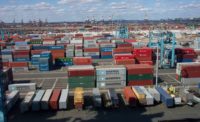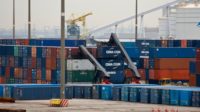Materials
US Will Switch to Tariff-Rate Quota for UK Steel Imports
Shift in policy is similar to recent tariff agreements with EU, Japan

The deal with U.K. officials marks the third tariff-rate quota arrangement set for foreign steel goods in sixth months.
Photo Courtesy of British Steel
US trade officials will replace a tariff placed on UK steel by the Trump administration with a tariff-rate quota arrangement that allows steel products to be imported duty-free, up to a certain volume, the US Commerce Dept. and US Trade Representative announced March 22.
The deal, which will take effect June 1, allows about 551,000 tons of steel to be imported from the UK without Trade Expansion Act Section 232 tariffs being applied. Steel imported beyond that volume will still be subject to a 25% duty, the same amount under the previous flat tariff.
Similar to tariff-rate quota agreements reached with the European Union and Japan in the past six months, the arrangement includes a “melted and poured” requirement, meaning that steel produced in another country could not be finished in the UK and then imported to the US without a duty. However, it does include a provision allowing up to about 41,000 tons of UK.-produced steel to be finished in the EU and then imported to the US counting toward the UK quota volume.
The quota volume will be adjusted each year based on US. steel demand data from the World Steel Association. For each 6% increase or decrease in US demand, the quota volume will similarly increase or decrease 3%.
The agreement also maintains an exclusions process for steel items not produced in the US, allowing them to potentially be imported without facing a tariff even beyond the quota volume.
Anirban Basu, chief economist for the Associated Builders and Contractors, says he expects the tariff-rate quota deals will help lower steel prices in the US. Given other global economic factors like the Russian invasion of Ukraine and supply chain disruptions, current high steel prices might be even higher without these arrangements, he adds. Basu expects that prices of commodities including construction materials will decline later this year.
“Given the inducement to supply more when prices are high, given the demand destruction that transpires when prices are high, given the slowing of the Chinese economy and given this latest round of trade agreements, we should see relief from elevated commodity prices later this year,” he says.
As part of the deal, the U.K. will also have independent audits performed of any UK-based steel producers with Chinese ownership. US officials say these audits will assess the influence of China’s government on the companies. Major UK steelmaker British Steel was purchased by Chinese multinational conglomerate Jingye Group in 2020.
A company representative said in a statement that it would work with the UK government to provide any necessary information, and that they “welcome this agreement and the opportunities it will bring.”
Philip Bell, president of the Steel Manufacturers Association, said in a statement that the agreement will help deal with global excess steel capacity, transshipment, illegal dumping and subsidies.
“We are glad to see that the arrangement also includes a requirement to audit Chinese owned steel producers in the UK,” Bell said. “This will help prevent favorable Chinese financing and subsidies and thwart China’s attempts to evade fair trade laws by using foreign investment.”
In response to the tariff-rate quotas, UK officials said they would suspend retaliatory tariffs placed on US goods such as whiskey, blue jeans and motorcycles. Commerce Secretary Gina Raimondo said in a statement that the steel deal will help “rebuild our relationships with our allies and partners around the world as we work to counter China’s unfair trade practices.”






